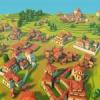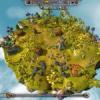Peter Molyneux has a huge range of big-name titles in his portfolio ranging from Fable to Dungeon Keeper. However his fame is largely due to his genre-creation skills, specifically of the so-called God Game which was arguably invented with Populous back in 1989.
A God Game is essentially a genre in which you are able to control most, if not all of the elements in a world. Populous and then, later, Black & White - both Molyneux’s creations - were at the forefront of this genre at the time of their release. However, as Lionhead Studios focus shifted increasingly to Fable since the company was purchased by Microsoft the genre has only seen occasional attention from developers.
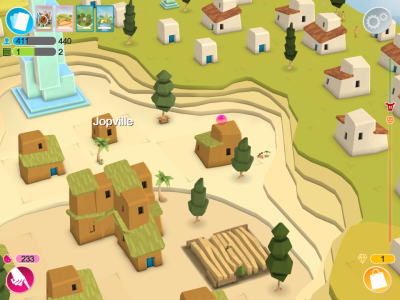 Thankfully, Molyneux’s recent venture having left Lionhead and Microsoft saw his return to the Ggod game genre, with a little game called Godus, announced via 22Cans’ social experiment Curiosity, which involved millions of people tapping away at a cube to eventually see what was held within it.
Thankfully, Molyneux’s recent venture having left Lionhead and Microsoft saw his return to the Ggod game genre, with a little game called Godus, announced via 22Cans’ social experiment Curiosity, which involved millions of people tapping away at a cube to eventually see what was held within it.
22 Cans, Molyneux’s new studio, started a Kickstarter campaign raising over £525,000 to fully develop Godus for Windows and Mac, which is ongoing. More recently, they’ve also recently released a free iOS version of the game which provides a slightly different experience to the desktop version but has otherwise made the transition to mobile intact. While initially little more than a proof of concept, with only bare bones gameplay, over the past months Godus has seen frequent additions made to gameplay mechanics. It still has a long way to go, but Godus today has a lot more meat on its bones than it did when it was first made publically available.
As soon as you start the game, you’re greeted by a tutorial explaining how the game works and what elements you can control. In the PC version this takes the form of Molyneux himself, along with other members of 22Cans, guiding you through the game, with additional comments about the team’s future plans for the title; on the iOS version, however, the tutorial simply takes the form of a series of text pop ups. The primary gameplay mechanic is your ability to shape and move the landscape in distinct layers - a bit like a stack of pancakes. You then learn that your people can only traverse this landscape one layer at a time, which encourages you to shape the terrain more efficiently as your progress.
I quickly set up camp in the promised land and began work on expanding my settlement, with my people building and breeding at an incredible speed - if I do say so myself. It’s surprising how easy it was to get hooked; the whole concept of continually expanding my settlement was an attractive one and led me to play the game for over an hour straight before putting it down the first time.
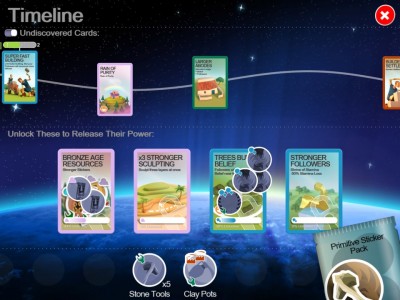 The next major mechanic you’re introduced to is the cards and stickers system. This involves unlocking cards as you progress, which can be acquired by either purchasing a packs through microtransactions, tapping on treasure chests buried around the world or via a minigame.
The next major mechanic you’re introduced to is the cards and stickers system. This involves unlocking cards as you progress, which can be acquired by either purchasing a packs through microtransactions, tapping on treasure chests buried around the world or via a minigame.
Once you have found and repaired the Docks, you’re able to take 30 villagers on a sea-faring voyage of exploration. Each voyage is made up of multiple stops unlocked in a strictly linear order, and each stop requires you to guide your crew from disembarking the ship to the temple located somewhere on a small island within a strict time limit. There’s some light puzzling involved in shaping the world and carving out the optimum route for your little people to follow, and the whole thing is reminiscent of the 90s puzzling classic Lemmings. It’s surprisingly addictive, and is refreshed every few days with a new set of destinations. The only issue is that some of the stops did become a little too difficult for my liking causing me to stop playing rather abruptly for a day or so. The reason behind this difficulty was actually an issue I had with the primary game mechanic.
On a more positive note I have been really impressed by the small details in the game. For instance, if you have an entire settlement of houses that all have belief for you, recognizable tunes will play as you tap through all the icons, in the style of the game’s sounds of squeaky pops and eerie pads. The graphical style is minimalist, but gorgeous to say the least, with some crisp but simple shapes which have fluid and cute animations to accompany them. There are plenty of other little things here to keep you amused; the names of the settlements you create are humorous at times but also bring you back to home (in my case at least) with some quintessential British town names.
The touchscreen controls are well suited to the tap-and-drag shaping of the layers which make up the world, but at times it’s clunky and frustrating. You’ll often find yourself grabbing the wrong layer and therefore using up your Belief on the wrong layer of land. It also means that during the minigame when you have to avoid certain hazards such as hostile giants and deadly swamps, that you can’t act quickly or precisely enough. The result is lots of dead crew members and feelings of resentment that you failure was the fault of the control system rather than your own lack of skill.
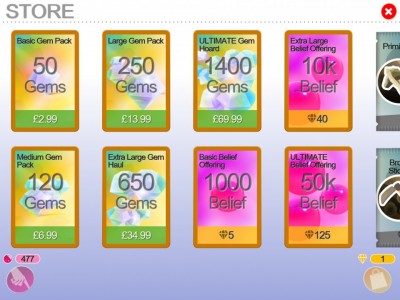 Belief is the primary currency of Godus and it can either be earned by performing godly acts like removing stones and trees or simply by tapping on households that appear with a pink bubble above them. The villages you create automatically generate belief whilst the inhabitants are at home and once the belief meter is full, that iconic pink bubble appears above their house, which can then be collected by tapping on it. If multiple houses have belief ready to be collected, dragging your finger across several homes in succession results in a little tune being played, a nice little touch.
Belief is the primary currency of Godus and it can either be earned by performing godly acts like removing stones and trees or simply by tapping on households that appear with a pink bubble above them. The villages you create automatically generate belief whilst the inhabitants are at home and once the belief meter is full, that iconic pink bubble appears above their house, which can then be collected by tapping on it. If multiple houses have belief ready to be collected, dragging your finger across several homes in succession results in a little tune being played, a nice little touch.
You need belief to perform everything, from leashing and guiding your followers to specific points, planting trees, and shaping the landscape. You can also construct monuments which provides beneficial effects within a small radius (such as increasing happiness or movement speed), or summon various natural hazards such as swamps or giant meteors.
Going back to my previous point about terraforming, any layer of land above the standard grass or below sea level requires belief. The higher or lower the land, the more belief it costs to shape, and huge amounts of belief can be lost simply by the game misinterpreting which layer you want to. This accidental terraforming actually happened to me more times than I could count. Thankfully, these issues aren’t much of a problem in the PC version, with chubby fingers and a small screen replaced by a mouse pointer which offers much more precision.
The biggest problem though, compounded by the difficulty shaping land on mobile, is that belief runs out rather quickly after spending it either carelessly or with purpose, resulting in a lengthy wait for your villages to generate more belief for you to collect. Unsurprisingly, the game asks you time and time again if you want to purchase a belief pack to keep you topped up. The secondary way of paying for things, such as speeding up construction or offering gifts to your people to keep them happy, are with gems. These can either be found in chests, awarded to you for various reasons, or in the ever-present treasure chest that is your wallet. It is also possible to mine them at a later point, but getting there is likely to take upwards of twenty hours and gems are few and far between. Sadly, this is Godus‘ major downfall on iOS: the temptation to bypass the increasingly lengthy waits for more belief by paying for the timer to tick down or for an instant belief boost.
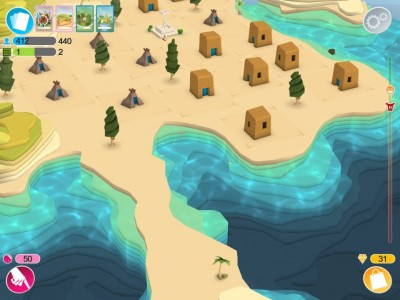 It strongly reminds me of the likes of Clash of the Clans or Farmville where time was your currency unless you were willing to pay out of your own pocket, which is a shame considering how much fun there is to be had here. On PC, however, there are no microtransactions - perhaps due to the need to pay money for the game in order to play it in the first place. On PC, microtransactions are replaced by a building called the Temple of Doom, which is unlocked very early on. Essentially a sacrificial altar, you can send your villagers to their death and in return you receive a handful of gems, at the expense of some happiness. Needless to say, if you want to make progress at a reasonable pace then you’ll be killing off plenty of your own followers. Intriguingly, the voiceover commentary from Molyneux suggests that later in development a full morality system will be added to the game, which will see your actions having real consequences on how your followers view you, perhaps in a similar way to how Molyneux’s own Black & White dealt with good and evil approaches.
It strongly reminds me of the likes of Clash of the Clans or Farmville where time was your currency unless you were willing to pay out of your own pocket, which is a shame considering how much fun there is to be had here. On PC, however, there are no microtransactions - perhaps due to the need to pay money for the game in order to play it in the first place. On PC, microtransactions are replaced by a building called the Temple of Doom, which is unlocked very early on. Essentially a sacrificial altar, you can send your villagers to their death and in return you receive a handful of gems, at the expense of some happiness. Needless to say, if you want to make progress at a reasonable pace then you’ll be killing off plenty of your own followers. Intriguingly, the voiceover commentary from Molyneux suggests that later in development a full morality system will be added to the game, which will see your actions having real consequences on how your followers view you, perhaps in a similar way to how Molyneux’s own Black & White dealt with good and evil approaches.
If you’re looking for a game that’ll keep you amused for a small portion of your time every day, Godus is definitely one to look at. Although it may not provide you with as much excitement as some other iOS game, it will certainly relax you and give you a little smile from time to time - and it’s important to note that Godus is far from a complete package. Godus is still in active development, with many core features not yet implemented, and that needs to be kept in mind when you start to play. If you are willing to avoid the imperfections and the constant reminders that you can spend real money to speed things up there’s plenty of fun to be had here, and we look forward to seeing how it develops in future.
Godus is already hugely improved over its initial release on PC, and it’s clear that Molyneux and the rest of his team are actively taking feedback on board and addressing player complaints. Whether it really is the future of the God Game that 22cans claims is still up for debate; but at the very least it’s a pleasant diversion with plenty of charm and personality.



